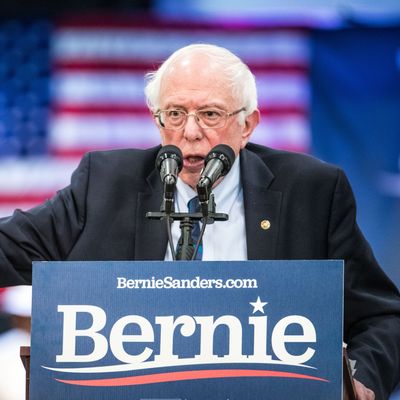
A popular pastime among those who are skeptical of Bernie Sanders’s chances of winning the 2020 Democratic presidential nomination is to compare his actual 2016 share of the vote in this or that state to where he stands in the polls right now. Here’s a tweet from Nate Silver doing just that:
My first reaction to this sort of comparison is that it doesn’t make a lot of sense to compare Sanders’s standing in 2016’s two-candidate field to where he is in a 20-candidate field so far this year. Matt Yglesias does have a response to that, though one that raises more questions than it answers:
The planted axiom here is that only “die hard” support from the get-go can win a presidential nomination. And the assumption that Bernie’s ceiling isn’t all that high is presumably based on Democrats’ proportional-delegate-award rules, in which you can’t win a majority of delegates with a consistent minority of popular votes in the caucuses and primaries, right?
Well, that’s sort of right. What this type of calculation ignores that’s particularly relevant in the current vast 2020 field is the Democrats’ 15 percent threshold: a candidate must hit that mark in the awarding jurisdiction (congressional or state legislative districts, or a state as a whole, depending on state rules) to get any pledged delegates. So if a lot of candidates don’t meet that threshold, then candidates that do are going to get more delegates than their share of the popular vote would initially indicate.
With that in mind, let’s look at recent poll standings (using FiveThirtyEight’s new comprehensive database of state primary and caucus polls) of Democratic candidates in the early states and see who’s above the threshold.
* In six Iowa polls taken in the last two months, Biden and Sanders are over the threshold in every one and no one else reaches it in any one.
* In four New Hampshire polls taken in the last two months, again, Biden and Sanders are over the threshold in every one and no one else reaches it in any one.
* There been just one recent Nevada poll, and it shows — you guessed it —Biden and Sanders over the threshold, with no one else even close.
* In one of two South Carolina polls taken in the last two months, Biden and Sanders are the only qualifiers for delegates (statewide, at least), and in the other, Sanders fall just short and no one else is close.
* The mold is broken in two recent polls in California (technically not an early state, but the most important state voting immediately thereafter, and where voting will begin even earlier), where home-state senator Kamala Harris gets above the threshold along with Biden and Sanders.
* And just to give a sense of where candidates stand in other states: There have been 17 national polls in the last two months, and guess what? Biden and Sanders are over the threshold in all of them, and no one else is over the threshold in any of them.
Now obviously it’s early, and obviously Biden and Sanders are the best-known candidates. Support for some of the lesser-known candidates may blossom, and for others it will probably wither as the first debates come and go and campaigning begins in earnest. But candidates who fade and/or drop out are likely going to give back some of their vote share to the front-runners, and those who stay in but fail to meet thresholds in this or that place will in effect give their share of the votes proportionately to those who get more than 15 percent. What makes Biden and Sanders special is that they are pretty strong everywhere, and thus are likely not to get shut out. So they have hidden delegate strength.
Over time, a winnowed field could lead to an overwhelming Biden lead that Sanders cannot overcome, or the converse. And one or two or three of the currently below-the-threshold candidates could gain strength and begin to pick up delegates, and a new front-runner or viable dark horse could emerge. But the thing to understand right now about Bernie Sanders is that he’s in a great position to get a big chunk of delegates in the early going (60 percent of the pledged delegates will be awarded in a two-week period from March 3 until March 17) — a bigger chunk than his share of the popular vote in polls would indicate — and also to survive to the later contests where a winnowed field means more votes and more delegates for the remaining candidates. And that’s not even factoring in his boffo fundraising.
In sum, Bernie Sanders may not need 2016 support levels until late in the nominating contest, and by then it could be a whole new ballgame for whoever is left.






























